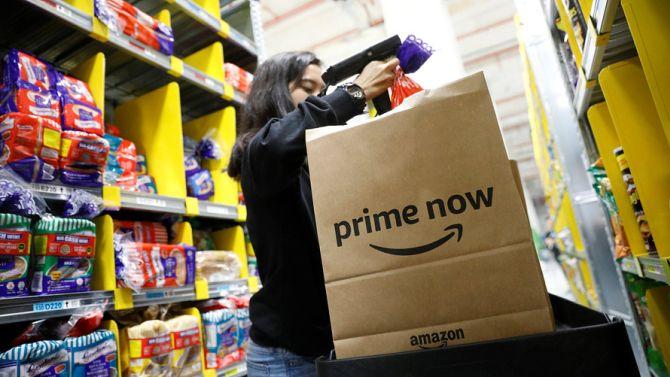 | « Back to article | Print this article |
What is aggravating the situation is that e-commerce firms are facing huge shortage of delivery personnel. They have not been able to bring back their staff to work, despite offering higher pay and Covid-related insurance packages.

E-commerce delivery has again started hitting roadblocks, despite a slight recovery in between, as several states prepare to enforce full lockdown in districts and cities considered Covid-19 hotspots.
What is aggravating the situation is that e-commerce firms are facing huge shortage of delivery personnel. They have not been able to bring back their staff to work, despite offering higher pay and Covid-related insurance packages.
Industry insiders said these firms were also finding it difficult to get enough passes, with the present curfew passes set to expire on April 14.
Bigbasket, for example, says it is running with just 60 per cent of its delivery capacity, with most of the delivery staff recruited over the last few days.
“Most of our employees are already covered under the medical, life, and health insurance schemes, while we have also announced a separate Covid insurance. But these are hardly yielding results in terms of bringing them back,” said Hari Menon, co-founder and CEO of Bigbasket.
According to the latest survey by LocalCircle, only 23 per cent of consumers surveyed were able to find fruits and vegetables via e-commerce apps, whereas 64 per cent of them were able to find these items via local vendors and retail stores.
“This means that these local vendors and stores are coming in handy for supplying fruits and vegetables, which is the case across India,” said Sachin Taparia, founder and chairman of LocalCircles.
A Forrester research shows that the sector -- dominated by mobile phones, electronics, and fashion-related products -- is expected to witness loss of sales to the tune of $1 billion during the lockdown.
“On an average, e-commerce firms are working at only 30 per cent of their capacity. These firms are facing supply issues and don’t have the stock (besides lockdown challenges). Further, a lot of their delivery executives have gone home. Hence, there is a change in (consumer behaviour), where customers are realising that local kiranas are better for essential products,” said Satish Meena, a senior forecast analyst at Forrester Research.
Consumer internet firms are bracing for measures like salary cuts and lay-offs to mitigate the impact of business losses, which is contributing to the deterioration in e-commerce deliveries, said experts. For now, Bounce, Shuttl, Fab Hotels, Instamojo, Zomato and Curefit, among others, are going for salary deductions, according to multiple sources.
During the first week of lockdown, thousands of trucks carrying essential commodities were stuck on the roads as they hadn’t received permits from local authorities. The government had earlier exempted sellers of essential supplies, including their entire logistics and supply chain, from the lockdown so that the supply could be maintained.
According to LocalCircles, many transporters alleged they were not allowed to cross state borders with empty vehicles after delivery of goods.
To better understand the situation, LocalCircles, in collaboration with the Department of Consumer Affairs, conducted extensive polls at the national and at state levels, to get insights into availability of fruits and vegetables in local markets and stores, and via e-commerce channels.
The survey received 95,000 responses from over 244 districts. Many consumers reported that e-commerce apps were just unable to supply fruits and vegetables during the lockdown.
Some consumers reported that if they were able to add fruits and veggies in their shopping basket, the e-commerce apps were cancelling these items at the last moment.